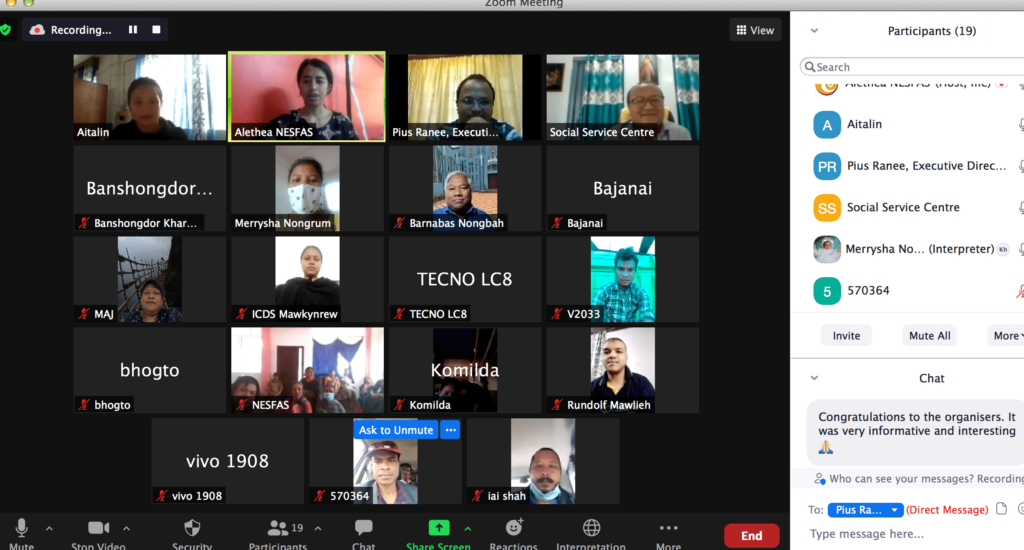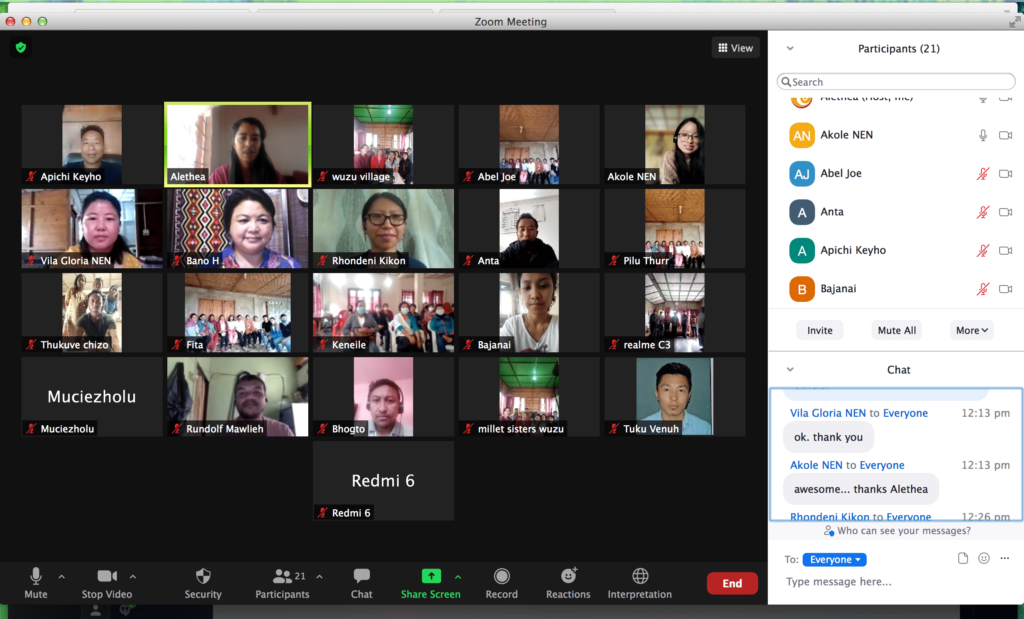NESFAS conducted four District Level Technical Workshops on Micro-Nutrient Rich and Climate Resilient Crop Species. The workshops provided a general overview of some of the developments that have been achieved from the “No One Shall be Left Behind Initiative: Biodiversity for Food, Nutrition and Energy Security Meghalaya and Nagaland, North East India” funded by the REC which spanned from 2018-2021.
Community members of project villages along with partner organizations (SSC Shillong, SURE Jowai and NEN Nagaland) and representatives from the Meghalaya and Nagaland Government participated in the virtual workshops that were conducted over the course of the past three weeks. Dr. Bhogtoram Mawroh, Sr. Associate Research, and Knowledge Management, NESFAS was the facilitator on all of these workshops and discussed the activities and progress that have been undertaken by NESFAS under the aforementioned project. He also highlighted the changes that have come about among the communities in Meghalaya and Nagaland since the initiation of the project three years ago.
Citing the adverse effects that come from over reliance of human beings on 12 plant and 5 animal species, Dr. Mawroh advocated the need to tap into local agrobiodiversity that exists for better improving nutrition, especially of micronutrients, in our daily diets. To drive home the point that varieties within species have different nutritional content which can have important implications he gave the example banana. Yellow/orange fleshed bananas were found to have much more rich Beta-carotene or β-Carotene (5945 mg/100 gm) compared to the white flesh (Cavendish) bananas which contain only 55 mg of β-Carotene per 100 gm. β-Carotene which is converted to Vitamin-A in our body is essential for the health of our skin, sight, as well as our immune system and the choice of eating the yellow/orange fleshed bananas over Cavendish bananas provide us with much more nutrition. The same is true for other species of plants and fruits.
He then proceeded to talk about the participatory mapping that was conducted in 32 partner villages across Meghalaya and Nagaland in the past three years. The results of the participatory mapping showed the availability of a significant diversity of food groups (i.e., agrobiodiversity) and variability in diet and nutrition among the project villages. However, the mapping exercise also revealed that less than 50% of the households were found to be consuming the minimum 5 food groups, ultimately failing to meet the minimum 5.0 Dietary Diversity Score (DDS). Among the food groups, staple food such as grains, wheat and rice were found to be consumed daily in every household while meat was consumed about 70% of households. Dairy product was one food group whose consumption was nonexistent among many of the villages mapped. There were also significant gaps in the consumption of other available food groups.
In order to improve the score, i.e., bring about dietary diversity, in all the villages, priority food crops were identified through the participatory mapping and production plans were put in place for increasing the production/harvesting from the local landscape. However, even though there has been a general consensus among the communities to increase production, there has been mixed results in the production plan with an increase of production seen in some crops while others have seen a decline; mostly due to climate changes. The reliance on foraging green leafy plants from the wild has also been documented in the pandemic as the communities start to realize the importance of these plants for immunity. It has also been found that Meghalaya still remains very poor when it comes to curbing malnutrition due to the consumption of a diet that is low in micronutrients.
With many of the findings from the participatory mapping to be taken back to the communities, Dr. Mawroh requested the policy makers and representatives from the Governments to come up with plans to support the farmers with the resources they need in regards to growing the prioritized food plants. He stressed on the importance of focusing on local food plants and called on the Government bodies to come up with policies that would improve food security in the State and also allow NESFAS to continue carrying out work with the communities.
Bah Demandson Lyngdoh, Officer, Horticulture Department, who was present in the webinar as the chief guest on September. 1st lauded NESFAS for the detailed mapping and the data that has been collected. He shared his opinion on how the youth of today from the urban seem to favour the fast food culture instead of indigenous food culture and urged NESFAS to develop means that would help bridge the gap between the urban and rural populace in terms of food habits. He also shared his concerns on how the introduction of high yielding variety seeds in the local agrobiodiversity has led to many adverse effects in terms of pest damage. As climate change affects the crop cycles and ecosystem, Bah Demandson encouraged the farmers to go for indigenous crops that are climate resilient as well as to diversify their crop system in order to avert the effects of climate change.
As a response to the various queries and issues raised by Bah Demand, Bah Pius Ranee, Executive Director, NESFAS briefly shared about the initiatives that have been taken by NESFAS to incorporate traditional ingredients into more appealing cuisines through the Mei-Ramew Cafe initiatives. Bah Pius also shared on how innovative recipes using indigenous ingredients have been introduced in various schools through Mid-Day Meal programs. In terms of the challenge posed by climate change and the introduction of new HYV seeds, Bah Pius referred to how NESFAS has worked with communities in setting up Community Seed banks over the project period to preserve the traditional seeds and species of food plants.

A snapshot of one of the workshops co-organised with our partner organisation Social Service Center (SSC)
For the workshop that was held the following day (2nd September), Fr. Bernard Laloo, Executive Director, SSC, acknowledged the impressive work NESFAS has done with the communities stressing it is no mean feat for NGOs to make a change in communities. Bah L. Tariang, Block Development Officer of Mawkynrew C&RD, stressed the need to bring about solutions to problems that plague these communities and also strongly advocated against the use of chemical fertilizers which has affected diversity in many villages.
The webinar with farmers and stakeholders from the Garo Hills region was conducted on the 11th of September. Mr. Ram Singh, the Deputy Commissioner of West Garo Hills relayed how the consumption of local food produce has gone down in recent years in the district. ‘Even in Meghalaya, despite being very rich in nutritional diversity, the state remains one of the worst performing states in nutrition,’ he added. Raising his concerns on the disappearing traditional knowledge of local foods, the DC urged NESFAS to conduct more programs that would help preserve the knowledge. There was also an urgent call to ensure that Indigenous Peoples are focused on food for both livelihood and nutrition. Mr. Ram Singh commended NESFAS for the insightful and interesting workshop and promised that the government would put to use the inputs and findings from the survey at the local level in collaboration with NESFAS.
The workshop with Nagaland communities on the 21st of September 2021 was attended by members of seven partner communities and the team from NEN, Nagaland. Bano Haralu, Conservationist & Environmentalist, NEN GB member, who was present as a special guest in the workshop identified the huge role that women play in preserving and passing on traditional farming knowledge at a juncture where modernisation has affected the lifestyle as well as food culture of communities. Making a strong statement on the need to protect our natural biodiversity, she served a poignant reminder to the communities on how the decisions they make today would affect the generations to come.

A snapshot of one of the workshops co-organised with our partner organisation North East Network (NEN), Nagaland.
The farmers, over the course of the different workshops, also weighed in with their experience on how pests and climate change have been major problems for the destruction and low yield of crops. They shared their aspirations for preserving local crop varieties and local seeds and called for the setting up of more community seed banks going forward. E.g. Farmers from Garo Hills attributed their low intake of seeds and nuts to the loss/extinction of plants such as black sesame and perilla in the area. The farmers also expressed their gratitude to NESFAS and the partner organisations for helping them preserve and protect food and plant species that were on the brink of getting lost through their intervention.
The webinar workshops ended with a consensus from all the participants to present the findings of the participatory mapping to the villages and called for policy makers to devise measures at the state level to help solve some of the underlying problems the communities are facing. As well as that, there was also a general agreement on the need to promote local biodiversity with focus on preserving the seeds through community seed banks.
 Translate
Translate




